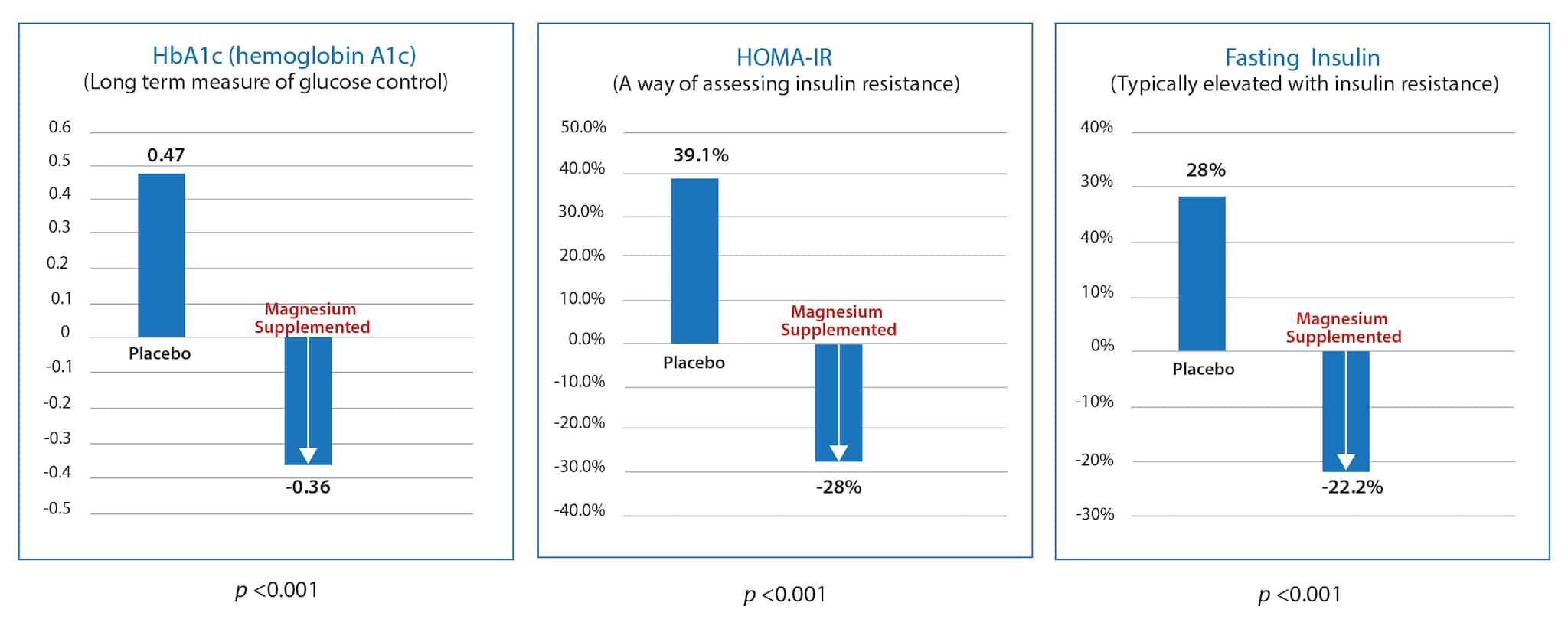Life Extension Magazine®
Nearly half of Americans consume less than the required amount of the mineral magnesium.1
At the same time, we face an epidemic of rising blood-sugar levels.
Research has shown that increased intake of magnesium can help lower the risk of developing diabetes.
A new study shows that magnesium can also help those who already have type II diabetes.
This human trial demonstrated that supplementing with magnesium improved insulin sensitivity by 28%. It also lowered a marker of glucose-induced tissue damage, called hemoglobin A1c, in middle-aged people with type II diabetes.2
The diabetic participants in the study who took magnesium had significant improvement in every indicator of glycemic control.2
Dangers of Low Magnesium

The relationship between type II diabetes and magnesium deficiency is well established.
Low magnesium is associated with insulin resistance,3 which happens when cells are unable to properly utilize insulin to metabolize glucose.2,4
Insulin resistance results in high blood sugar, and all too often progresses to type II diabetes.5,6
The opposite of insulin resistance is youthful insulin sensitivity, when cells respond well to insulin.
The ability to decrease insulin resistance and increase insulin sensitivity is the key to glycemic control (keeping blood sugar in a target range).
Reducing exposure to high blood sugar can help prevent many of the long-term consequences of uncontrolled diabetes, including heart disease, stroke, kidney disease, blindness, and neuropathy.2,7
Magnesium Lowers Insulin Resistance in a Human Study

A study done in late 2018 showed that magnesium plays a vital role in controlling blood sugar.
Researchers conducted a randomized, controlled clinical trial on 40 patients with type II diabetes. After a dietary stabilization period to ensure that all subjects began the study with a similar nutritional status, each subject received either 250 mg of magnesium daily or a placebo.2
Both groups were advised to stick to a healthy diet, with specific guidance on avoiding added sugars.2
The trial lasted for three months, and various measures of glycemic control—including indicators of blood sugar, insulin production, and insulin resistance—were tested at the start and the end of the study.2
The placebo group showed decreases in measures of glycemic control. In other words, those patients’ ability to manage high blood sugar got worse.
Significant improvements in glycemic control were seen in the group taking magnesium.
The magnesium-supplemented group had lower blood sugar, lower hemoglobin A1c (a marker of long-term glucose control), and improved insulin sensitivity by 28% as seen by measurement of HOMA-IR (homeostasis model assessment of insulin resistance).2 In the placebo group not supplementing with magnesium, insulin sensitivity worsened by 39%.
High levels of insulin are associated with increased cancer risk. Because sensitivity to insulin was increased in the magnesium group, they made less excess insulin, likely lowering that risk.8-10

Significant decreases in HbA1c, insulin, and in HOMA-IR are seen in magnesium supplemented individuals over the three-month study, compared to the placebo group.2 A decrease in HOMA-IR means that insulin sensitivity improved.
Summary

Improving insulin sensitivity is one of the most important ways to reduce the harmful impact of type II diabetes.
When cells are sensitive to insulin, it means they can respond appropriately to insulin’s blood-sugar-lowering signal.
This new study shows that magnesium improves insulin sensitivity in type II diabetics.
People who took 250 mg per day of magnesium had significant improvements in multiple measures of glycemic control, including lower blood sugar, insulin, and hemoglobin A1c.
Subjects who took a placebo had a worsening of all glycemic control indicators.
This study adds to a large body of evidence that magnesium intake is critical for keeping blood sugar under control and for lowering the risk for diabetes-associated disorders.
While diabetics must pay careful attention to their diet, maintain physical activity, and usually need prescription drugs like metformin, supplementing with low-cost magnesium can provide significant, added, protective benefits.
If you have any questions on the scientific content of this article, please call a Life Extension® Wellness Specialist at 1-866-864-3027.
References
- Costello RB, Elin RJ, Rosanoff A, et al. Perspective: The Case for an Evidence-Based Reference Interval for Serum Magnesium: The Time Has Come. Adv Nutr. 2016 Nov;7(6):977-93.
- ELDerawi W, Naser IA, Taleb MH, et al. The Effects of Oral Magnesium Supplementation on Glycemic Response among Type 2 Diabetes Patients. Nutrients. 2018 Dec 26;11(1).
- Chutia H, Lynrah KG. Association of Serum Magnesium Deficiency with Insulin Resistance in Type 2 Diabetes Mellitus. Journal of laboratory physicians. 2015 Jul-Dec;7(2):75-8.
- Kolterman OG, Gray RS, Griffin J, et al. Receptor and postreceptor defects contribute to the insulin resistance in noninsulin-dependent diabetes mellitus. J Clin Invest. 1981 Oct;68(4):957-69.
- Hines IN, Hartwell HJ, Feng Y, et al. Insulin resistance and metabolic hepatocarcinogenesis with parent-of-origin effects in AxB mice. Am J Pathol. 2011 Dec;179(6):2855-65.
- American Diabetes A. Diagnosis and classification of diabetes mellitus. Diabetes Care. 2010 Jan;33 Suppl 1:S62-9.
- Hill J. Preventing type 2 diabetes: a role for every practitioner. Community Pract. 2012 Oct;85(10):34-6.
- Ahmadieh H, Azar ST. Type 2 diabetes mellitus, oral diabetic medications, insulin therapy, and overall breast cancer risk. ISRN Endocrinol. 2013;2013:181240.
- Albanes D, Weinstein SJ, Wright ME, et al. Serum insulin, glucose, indices of insulin resistance, and risk of prostate cancer. J Natl Cancer Inst. 2009 Sep 16;101(18):1272-9.
- Dankner R, Shanik MH, Keinan-Boker L, et al. Effect of elevated basal insulin on cancer incidence and mortality in cancer incident patients: the Israel GOH 29-year follow-up study. Diabetes Care. 2012 Jul;35(7):1538-43.

